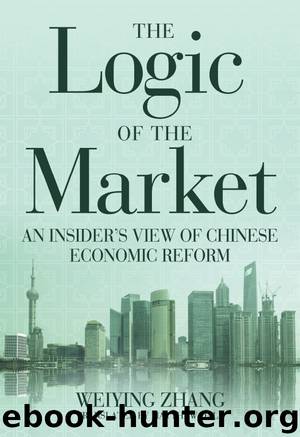The Logic of the Market: An Insider's View of Chinese Economic Reform by Weiying Zhang

Author:Weiying Zhang [Zhang, Weiying]
Language: eng
Format: epub
Publisher: Cato Institute
Published: 0101-01-01T00:00:00+00:00
11. China’s State-Owned Enterprise Reform: A Corporate Governance Perspective
State-owned enterprise (SOE) reform has been on the top of China’s economic reform agenda since 1984. Is China’s SOE reform a success or a failure? The answer is almost evenly distributed among economists. One argument—mainly from foreign economists concerned with China (“outsiders”)—is that the reform has been quite successful in improving total factor productivity (TFP). Another argument comes from the research of influential economists.1 According to their studies, the annual increase in TFP has been 2 percent to 4 percent since 1979, much higher than in the pre-reform period.2 According to that finding, some economists even argue that private property rights may not be necessary for efficiency.
But most Chinese economists (“insiders”) think that the reform has been unsuccessful, at least in the profitability of SOEs. It is widely reported (and most people believe) that one-third of SOEs take explicit losses, another one-third take implicit losses, and only one-third are slightly profitable.
Why are the viewpoints so divergent? One possible explanation is that the outsiders use econometric models to draw their conclusions, whereas the insiders base their judgments on their daily experience and intuition. When aggregated data are used to analyze the performance of the reform, it is quite possible to ignore some important phenomena. Conversely, when intuitive judgment is used, one might see the trees but not the forest. The second possible explanation might be psychological. Chinese economists are “forward looking”; they compare today’s situation with the ideal model in their minds, and they are unhappy whenever they find undesirable gaps between reality and ideality. In contrast, foreign economists are “backward looking,” comparing today’s situation with the past. They are happy whenever they find that today is better than yesterday.
Certainly, that explanation cannot be the whole story. The most important question is, what criteria should one use in evaluating the SOE reform? For China’s SOEs, both TFP and profitability are heavily distorted indictors (but TFP is better than profit). In my view, the proper criterion should be “qualitative.” “Corporate governance” is such a candidate. Corporate governance is a concept characterizing the contractual relation between different members of the firm. It is structured for solving the two basic problems inherent within the firm: (a) the incentive problem—that is, how to motivate all participants of the firm to contribute to the firm’s output, given that output is a collective outcome and individual contribution is hard to measure—and (b) the management selection problem—that is, what kind of mechanism can ensure that only the most entrepreneurial people are employed to fill the management position, given that entrepreneurial ability is hard to observe?
From the point of view of corporate governance, my basic argument is that China’s SOE reform has been relatively successful in solving the short-term managerial incentive problem, but more important, it has been unsuccessful in solving the management selection mechanism and the long-term managerial incentive problem. Specifically, the variety of reform measures adopted since 1978 (basically the management contracting system) has provided the incumbent managers of
Download
This site does not store any files on its server. We only index and link to content provided by other sites. Please contact the content providers to delete copyright contents if any and email us, we'll remove relevant links or contents immediately.
International Integration of the Brazilian Economy by Elias C. Grivoyannis(110682)
The Radium Girls by Kate Moore(12018)
Turbulence by E. J. Noyes(8040)
Nudge - Improving Decisions about Health, Wealth, and Happiness by Thaler Sunstein(7694)
The Black Swan by Nassim Nicholas Taleb(7111)
Rich Dad Poor Dad by Robert T. Kiyosaki(6613)
Pioneering Portfolio Management by David F. Swensen(6289)
Man-made Catastrophes and Risk Information Concealment by Dmitry Chernov & Didier Sornette(6007)
Zero to One by Peter Thiel(5789)
Secrecy World by Jake Bernstein(4742)
Millionaire: The Philanderer, Gambler, and Duelist Who Invented Modern Finance by Janet Gleeson(4469)
The Age of Surveillance Capitalism by Shoshana Zuboff(4279)
Skin in the Game by Nassim Nicholas Taleb(4240)
The Money Culture by Michael Lewis(4198)
Bullshit Jobs by David Graeber(4179)
Skin in the Game: Hidden Asymmetries in Daily Life by Nassim Nicholas Taleb(3993)
The Dhandho Investor by Mohnish Pabrai(3760)
The Wisdom of Finance by Mihir Desai(3735)
Blockchain Basics by Daniel Drescher(3574)
